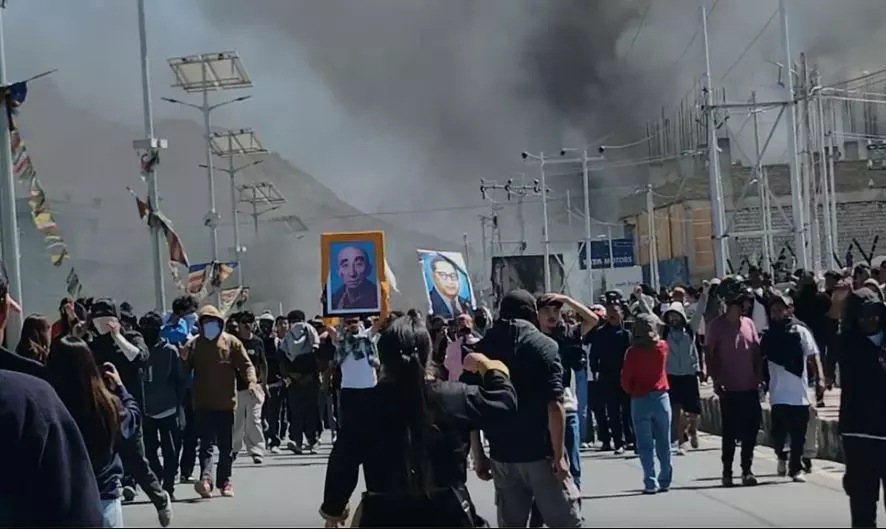
Extinguish the conflagration in Ladakh
text_fieldsLeh Apex Body (LBA), one of the main outfits in Ladakh, has withdrawn from further talks aiming to establish peace in the conflict-ridden Ladakh. Another organization, the Kargil Democratic Alliance, is also mulling over retracting from the talks. They are withdrawing from the talks with the central government on demands including statehood and protection under the Sixth Schedule of the Constitution. The LBA finds no relevance in further talks in the wake of the central government's confrontational approach and jailing of leaders including Sonam Wangchuk, who was on a hunger strike. The entire Ladakh is awash in grief, fear, and anger. They refused any talks unless the situation changes and normalcy returns creating an atmosphere conducive for talks. The central government's handling of the hunger strike—demanding statehood which Ladakh lost as Jammu and Kashmir's special status was revoked and the protection under the Sixth Schedule of the Constitution which grants special rights to the northeastern states —led to violence. Local organizations have been raising these demands for a long time. They also demanded two Lok Sabha constituencies and a Public Service Commission. Following prolonged protests by the LAB and the Kargil Democratic Alliance (KDA), the Union Home Ministry formed a high-powered committee in January 2023 and held discussions on these issues several times. There were no follow-up talks after May 27. After the police forcibly shifted two people, who were taking part in the hunger strike led by prominent education and environmental activist Sonam Wangchuk demanding talks, youths took to street in protest. Four people were killed and 30 injured in police firing during the protest. The protesters set fire to the council secretariat and the BJP office.
As the protest turned violent, Wangchuk ended his hunger strike. Later he was arrested, as if in revenge, under the National Security Act on charges of inciting a mob to riot. A CBI investigation has also been launched. The license for his institution to receive foreign aid has also been revoked. Wangchuk is lodged in Rajasthan’s Jodhpur prison. Wangchuk, who has won recognition internationally, was branded a seditionist in a single day. It does not take long for things to go topsy-turvy in new India. Just the other day, the house of Indian hockey legend Shahid was demolished in the name of development. It was in August 2019, the central government revoked Article 370 that granted special status to Jammu and Kashmir. Opposition to Article 370 was one of the cornerstones of the Sangh Parivar. Following this, dividing the state of Jammu and Kashmir into two union territories of Jammu and Kashmir and Ladakh, Jammu and Kashmir was given a separate legislative assembly and administrative system on the model of Delhi. Article 370, a gift to Kashmiris by the post-independence government, was added to the constitution in 1954.
The criticism that the central government's attempt to deal with the protests with an iron fist thus worsening the situation cannot be dismissed. The central government, and especially the Home Ministry, had a responsibility to prevent such a situation from arising in Ladakh, a strategic region sharing borders with foreign powers. The fact that normalcy has not been restored in the valley even more than five years after dividing Kashmir and the people of Ladakh intensifying protests must be taken seriously. The people of Kargil are fighters. The country witnessed their fighting spirit against the occupying forces in 1962 and 1999. How ironic it is for a government failing to win their trust to give sermons on nationalism. The people of Ladakh live directly in the harsh climate and difficult terrain in one of the highest regions in the world. The feelings of those people must be respected. The central government should be ready to create a favorable environment to resume talks as soon as possible. The organizations in Kargil and, if necessary, Wang Chuk himself should be made mediators. People for Himalaya has called for a bandh in the Himalayan states on October 2 against the atrocities committed by the Ladakh police. The central government's stance that avenues for talks are not closed suggests hope. The central government itself should take the initiative to implement it.






